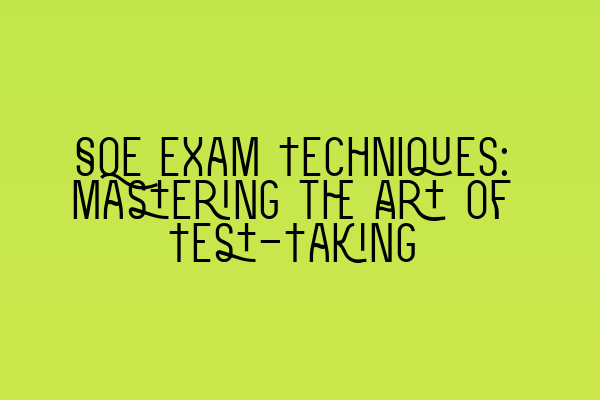SQE Exam Techniques: Mastering the Art of Test-Taking
Preparing for the Solicitors Qualifying Exam (SQE) can be a daunting task. With so much information to absorb and apply, it’s crucial to develop effective exam techniques that will help you master the art of test-taking. In this article, we’ll explore some strategies and tips to enhance your performance and boost your chances of success in the SQE.
1. Familiarize Yourself with the Exam Structure
One of the first steps in preparing for the SQE is to familiarize yourself with the exam structure. Understanding the format of the exam will give you a clear idea of what to expect and how to approach each section. The SQE consists of two stages: SQE1 and SQE2.
SQE1 focuses on the application of legal knowledge in practical scenarios. It consists of multiple-choice questions (MCQs) and written exercises. To excel in this stage, it’s important to practice answering MCQs and develop strong writing skills.
SQE2 assesses your practical legal skills, such as interviewing clients, advocacy, and legal research. This stage is more interactive and requires a hands-on approach. It’s recommended to engage in mock exercises and role plays to enhance your skills.
2. Create a Study Plan
Creating a study plan is essential for effective exam preparation. It helps you stay organized, manage your time efficiently, and ensures you cover all the necessary topics. Start by identifying your strengths and weaknesses, and allocate more time to areas where you need improvement.
Break down your study plan into manageable chunks, focusing on specific topics or themes each day. This approach will help you maintain focus and prevent overwhelm. Incorporate regular revision sessions to reinforce your learning and keep the information fresh in your mind.
It’s also important to schedule breaks and rest days in your study plan. Taking time to relax and recharge will prevent burnout and enhance your overall productivity.
3. Practice Past Papers
Practice makes perfect, and this holds true for the SQE as well. Practicing past papers is an excellent way to familiarize yourself with the type of questions asked and the exam structure. It allows you to gauge your progress, identify areas for improvement, and build confidence in your abilities.
When answering past papers, pay attention to the mark schemes and examiner’s comments. This will help you understand the expectations and scoring criteria, allowing you to tailor your answers accordingly.
4. Time Management
Time management is crucial in any exam. Develop a strategy that enables you to answer questions efficiently without rushing or leaving any unanswered. During your practice sessions, time yourself to get a sense of how long it takes to complete each section.
For MCQs, read the question carefully, eliminate obviously incorrect options, and choose the best answer. Don’t spend too much time on one question. If you’re unsure, make an educated guess and move on. You can always revisit it later if you have time remaining.
For written exercises, allocate time for planning, writing, and reviewing your answers. Aim to present coherent arguments and use concise language to convey your thoughts effectively.
5. Stay Calm and Confident
Exam nerves are common but managing them is essential for optimal performance. Prioritize self-care leading up to the exam day. Get enough sleep, eat well, and engage in activities that help you relax and reduce stress.
On the day of the exam, arrive early, find a comfortable spot, and take deep breaths to calm your mind. During the exam, if you feel overwhelmed or anxious, take a moment to pause, close your eyes, and refocus. Remind yourself of your preparation and the hard work you’ve put in.
Don’t let a difficult question or a momentary lapse in concentration derail your performance. Stay confident, trust your knowledge and abilities, and give each question your best shot.
Conclusion
Mastering the art of test-taking for the SQE requires a combination of knowledge, skills, and effective exam techniques. By familiarizing yourself with the exam structure, creating a study plan, practicing past papers, managing your time efficiently, and staying calm and confident, you’ll be well-prepared to tackle the challenges of the SQE.
For more insights on property law and other related topics, check out our articles:
- Tenant Rights in the UK: Understanding Your Legal Protections
- Examining the Intricacies of Land Law in the UK
- Legal Considerations in Residential Leases: Essential Insights for Solicitors
- Workshops on Land Law: Interactive Learning for Aspiring Property Law Professionals
- Lease Laws in the UK: Unraveling the Legal Framework for Tenants

Leave a Reply